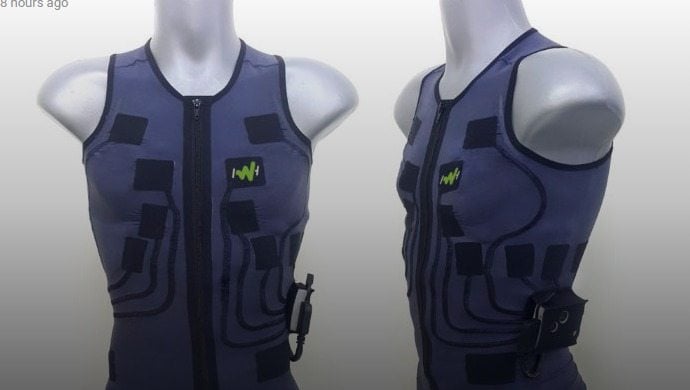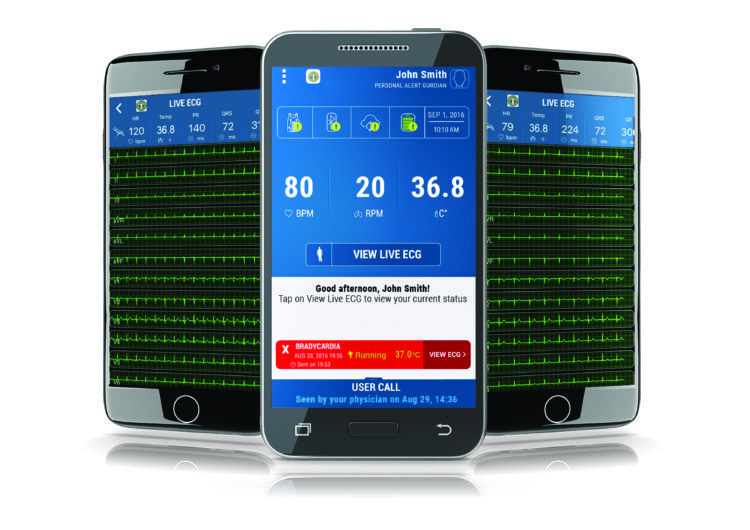This FDA-approved wearable tracks heart health, giving cardiac patients peace of mind

Image Credit: HealthWatch
Kfar Saba-based wearables startup HealthWatch announced on Tuesday the start of their new joint venture with Chinese pharmaceutical firm Yiling, giving it entry into the highly prized Sino market and a US$20 million strategic investment to help ease the process.
According to the company, US$5 million of the financing will be used for applying for their exclusive license for marketing in China as a new company, while the other US$15 million will be put into product improvements, enlarging clinical studies, as well as launching marketing and sales efforts in various geographies.
Up to this point, HealthWatch had received US$10 million in funding from private investors, angel groups, and a Chinese VC. This new round brings the total funding to US$30 million.
Co-founded in 2010 by Chairman Dr. Yoram Romem and Director and CFO Amos Shattner, HealthWatch has developed a heart monitoring device that is capable of providing continuous updates about the user’s health.
Interestingly, both co-founders were part of the successful parking app Pango before moving into this sector.
Also Read: HealthifyMe raises US$1M to save Indians from the risk of dying at a young age
The idea for the product came after Romem’s father suffered a heart attack. An otherwise healthy man, the incident came as a bit of a shock. A former navigator in the Israeli Air Force, Romem thought of the Master Caution light in a fighter jet that tells the pilot that there is an issue that demands immediate attention, which led him to conceptualise the need for early warning systems for the body.
What emerged from this was a wearable product comprised of sensors that are embedded into an undershirt that can be worn under the user’s regular clothes and transmit data about the wearer back to medical professionals through the cloud.
The system is comprised of four elements:
- The hWear Digital Garment (the shirt)
- The MasterCaution Device, which sits in a small pocket on the shirt
- The MasterCaution app, and
- The MasterCaution Cloud.
The company says that its product serves as a replacement for standard ECG tests. HealthWatch has already received approval from the FDA as well as the CE mark for the European market.

Image Credit: HealthWatch
The shirt — with options for men and women, is described to be similar to a compression top like the kind that is used for working out — is able to constantly collect the user’s vitals, all without the need to attach electrodes to the wearer’s skin.
Also Read: Practo acquires Bangalore-based healthcare analytics startup Enlightiks
“Figuring out how to connect to the wearer comfortably and without wires was one of the major challenges in developing the product,” HealthWatch’s International Sales Manager Limor Nuri told Geektime.
She explained that a primary goal of the product is to allow their users, people who have recently had a heart-related incident or others who are at high risk, to live normally without always worrying about if they are about to have a heart attack. This means fewer trips to the hospital for routine checkups that can now be done remotely.
Moving forward with new funding in hand, Nuri said that the company hopes to continue making adaptations to the product according to market feedback. Viewing the shirt as a platform that can provide a range of data points, Nuri told Geektime that, “Today if you look at the data that you can take from the shirt, temperature, heart rate, location, this is just the start.”
The company wants to add SpO2 sensors that measure the amount of oxygen in the blood, as well as a mechanism for checking blood pressure, essentially becoming a mobile nurse station. Additionally, HealthWatch also want to make more apps for elements like fitness, pregnancy, and possibly for people in special jobs like jetliner pilots.

Image Credit: HealthWatch
Also Read: Healthy habits: These 6 healthcare startups give easier access to medical help
A growing global focus on wearable health solutions
As Geektime has noted in recent articles, there continues to be a strong interest from Chinese companies in Israeli tech know-how, and a willingness to form partnerships like these joint ventures. In particular, as China (and the rest of the world, for that matter) gears up to deal with an ageing population, the country is searching for healthcare solutions that can cut costs and keep the system from buckling under the weight of a large generation of older adults.
The recent trend in healthcare has pointed towards prevention and early detection and remote solutions that keep the patient out of the hospital as much as possible. This is an important point for countries like China, where the hospital is the primary point of care, lacking many of the private clinics and home options available in the West. Add to this shortage of care the spike in heart issues related to changes and diet (and likely environmental as well), and the need for solutions only becomes more explicit.
Nuri said that the process of getting permissions in China will likely take somewhere between a year and a half to two years, meaning that it will take some time for the fruits of the company’s efforts to ripen. However, given the size of the market and for disrupting the current system there, Romem and his team are confident that it is worth the effort.

Business people talking in meeting. Image Credit: John Wildgoose / Getty Images Israel
In exploring the partnership, Romem said that the team first found its way into the Chinese marketplace through interactions with local investors who had participated in the company’s earlier funding round. By expanding this relationship, they were able to link up with Yiling, an established public pharmaceutical company that specialised in cardiac medicine and owns a large hospital. It would seem that by laying the groundwork through local members of the scene, HealthWatch was able to become visible when Yiling went looking for a device partner.
Also Read: FitMeIn fits in undisclosed pre-Series A from Japanese healthtech firm FiNC
Romem admitted that finding the right partner in China can be difficult, especially coming as an outsider. “Being strangers in China, we had natural concerns of communication and understanding who is a serious player, fitting to the type of product we offer,” he said.
He told entrepreneurs who are looking at moving into China that they should study the market needs and trends. “Not every product fits the Chinese market, even if it succeeds in the west. Find a local partner, preferably a Chinese investor, preferably with good English and experience in working with the western companies, who will help you in finding the strategic partner.”
Beyond the technical challenges, there are always cultural barriers. He said that doing business there requires a lot of patience and openness to the Chinese way of thinking, and advises “listening before telling them what to do.” This can contrast with the Israeli mode of operation, which can be tough but necessary.
Also Read: Startupbootcamp sets foot in China to make it more e-healthy
My thoughts
Nuri makes the point that HealthWatch’s product is actually defined as a medical device, as opposed to the various consumer wearables out there that check heartbeats and count steps.
While I have recently become a fan of the gamified health tracker, I am a little less confident in its accuracy. This fudging of the stats can be fine for me, a relatively healthy and active person who is mostly interested, but would be far less so for someone who has recently experienced a cardiac incident and needs to have the correct numbers being reported.
Devices like the MasterCaution have the potential to dramatically alter the quality of life for heart disease patients for the better. By keeping them out of the hospital, which itself can put them at risk, costs and stress levels can be kept to a minimum. More importantly, by making the process of performing these checks less of a hassle, people are more likely to actually make use of them, and the constant stream of data is always better than the intermittent tests at the hospital.
—-
The article Israeli HealthWatch – inspired by founder’s father’s heart attack – receives $20M to enter China first appeared on Geektime.
The post Close to your heart: Cardiac event inspires launch of Israel’s HealthWatch — Now it enters China with US$20M funding appeared first on e27.